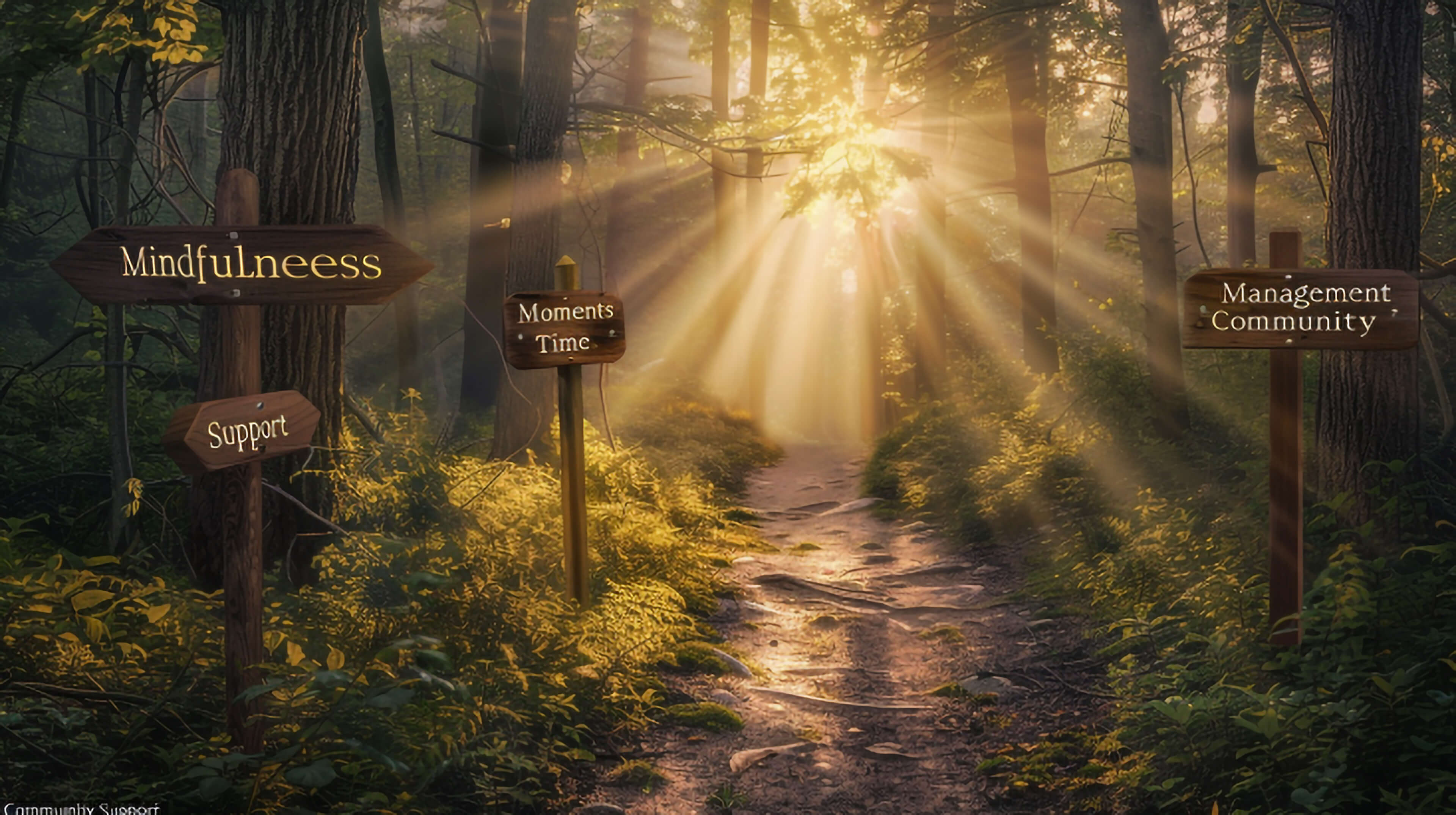Introduction
Have you ever felt like there’s a deeper level of health and understanding just beyond your grasp? What if the key to unlocking this potential was not through more traditional methods, but through a journey of self-enlightenment? Consider the story of Mia, who for years battled with chronic anxiety. Traditional therapies and medications had only provided fleeting relief. It wasn’t until she embraced a holistic approach—incorporating meditation and mindfulness into her daily routine—that she experienced a profound shift. Her anxiety didn’t just diminish; it became a manageable aspect of her life, offering her insights into her own mental landscape and a newfound sense of peace.
Enlightenment in the context of mental health extends far beyond its traditional spiritual connotations. It embodies a deep understanding of life and self from both existential and psychological perspectives. This broader perspective on enlightenment, supported by both ancient practices and contemporary psychological research, can lead to significant improvements in mental health. It provides not only a pathway out of suffering but also a deeper insight into our emotional and mental processes, enriching our overall life experience.
In this article, we explore the benefits of a holistic approach to mental health that integrates body, mind, and spirit. This approach not only promotes mental health but also enhances overall wellbeing by aligning our internal states with external actions and environments. Through the forthcoming sections, you will discover practical techniques, scientific insights, and inspiring stories that demonstrate the effectiveness of holistic practices. Whether you’re a skeptic of non-traditional methods or someone who has tried everything without satisfaction, this journey towards enlightenment offers a fresh perspective that could be the key to a healthier, more balanced life.
As we delve deeper into these transformative concepts, let’s first define what we mean by ‘mental health’ and ‘enlightenment’, and why their integration is not just beneficial, but essential for a fulfilling life.
Understanding Mental Health and Enlightenment

Definitions and Importance
Mental health, from a psychological perspective, involves emotional, psychological, and social well-being. It affects how we think, feel, and act as we cope with life. It also determines how we handle stress, relate to others, and make choices. From a philosophical standpoint, mental health can be seen as a state of balance, both within oneself and in interaction with the environment. This balance is crucial not only for personal satisfaction but also for contributing effectively to society.
Enlightenment, traditionally viewed through a philosophical lens, is the process of attaining profound knowledge about oneself that transcends mere intellectual understanding to achieve deep realization. Psychologically, enlightenment involves an increased level of self-awareness, impacting mental health and daily functioning. This greater awareness enables individuals to recognize their thought patterns, emotional responses, and deeper beliefs, fostering better mental health management.
Integrating mental health and enlightenment is vital for comprehensive well-being. This fusion encourages a deeper understanding of oneself, enhancing resilience against life’s stresses and promoting a more fulfilling life. It provides tools for individuals to manage their mental states more effectively, leading to a harmonious life that aligns with their inner values and beliefs.
Historical Perspectives
Culturally, the approaches to mental health and enlightenment have varied widely. Eastern traditions such as Buddhism and Hinduism have long incorporated practices aimed at enlightenment and mental balance, viewing them as interconnected aspects of a well-lived life. These practices include meditation, mindfulness, and yoga, which are seen as ways to achieve both spiritual growth and emotional stability. Conversely, Western philosophies have often treated mental health and spiritual enlightenment as separate disciplines, with a more recent trend towards integrating these aspects through holistic health movements and psychospiritual therapies.
Key thinkers such as Carl Jung in the West have made significant contributions by linking the spiritual and psychological aspects of human experience. Jung’s concept of individuation, or the psychological process of integrating the conscious with the unconscious, is a form of personal enlightenment that directly impacts mental health. Similarly, the Dalai Lama has exemplified how spiritual practices like meditation can lead to a peaceful mind and a healthy body, emphasizing that the pursuit of spiritual growth should also promote emotional tranquility.
The Science Behind Enlightenment and Mental Health

Neuroscience Insights
Have you ever wondered what happens in your brain when you meditate or practice mindfulness? Neuroscience, the study of the nervous system, has begun to uncover how these ancient practices profoundly affect our modern lives, particularly our mental health. Through various scientific methods, including brain imaging, researchers have been able to observe the physical changes that occur in the brain during meditation and mindfulness exercises.
Meditation and mindfulness activate specific areas of the brain that are crucial for reducing stress, regulating emotions, and maintaining attention. Studies using functional magnetic resonance imaging (fMRI) show increased activity in the prefrontal cortex, the part of the brain associated with higher order brain functions such as awareness, concentration, and decision-making. Simultaneously, there is decreased activity in the amygdala, the area involved in processing fear and stress responses. This change in brain activity supports a calmer and more focused state of mind.
The impact of these brain changes extends directly to our experiences of stress, anxiety, and depression. Research has demonstrated that individuals who engage in regular mindfulness practices exhibit lower levels of stress hormones such as cortisol. Furthermore, systematic reviews have found that meditation and mindfulness can significantly reduce symptoms of anxiety and depression, making them effective complementary therapies for mental health disorders. These benefits are supported by both subjective reports from participants and objective measurements from brain scans and hormonal assessments.
Psychological Benefits
Engaging in spiritual practices like meditation does not only calm the mind but also builds emotional resilience. This resilience enables individuals to better manage life’s ups and downs with greater ease and less distress. For example, those who meditate regularly tend to recover from stressful events more quickly, and they report a higher overall life satisfaction. This improved resilience contributes directly to enhanced mental health, as individuals are less likely to succumb to the adverse effects of psychological stress.
The cognitive benefits of these practices are equally impressive. Regular practitioners of meditation and mindfulness report improved memory and better problem-solving skills. These benefits likely arise from the practices’ ability to increase focus and concentration, as well as from their impact on enhancing neural connectivity in the brain. Emotional intelligence is another area greatly improved by these practices. Through increased self-awareness and empathy, individuals become better equipped to handle interpersonal challenges and complex emotional landscapes.
The overall psychological benefits of integrating spiritual practices into daily life are transformative. They extend beyond mere self-improvement, reaching into every aspect of personal and professional life. By enhancing mental health and cognitive abilities, these practices help individuals lead more balanced, effective, and fulfilling lives.
Unlocking the Mind: An Animated Journey into the Science of Mindfulness
Practical Ways to Nurture Mental Health through Enlightenment

- Meditation Techniques
Have you considered starting a meditation practice but don’t know where to begin? Meditation can seem daunting at first, but it’s actually quite accessible with the right approach.
Guide on Starting Meditation
To start, choose a quiet place where you won’t be disturbed. Set a regular time each day for your practice, which helps create a habit. Begin with just a few minutes each session, focusing on your breath. Breathe naturally and pay attention to the breath entering and leaving your body. If your mind wanders, gently bring your attention back to your breathing.
Types of Meditation
There are several types of meditation you can explore:
– Mindfulness Meditation: Stay present and observe your thoughts without judgment.
– Transcendental Meditation: Use a mantra—a repeated word or sound—to help focus your thoughts.
– Guided Visualization: Follow guided imagery or scenarios to reach a state of relaxation and inner peace.
Tips for Consistency
To maintain consistency:
– Use a meditation app to track your progress and remind you to practice daily.
– Set small, achievable goals to keep yourself motivated.
– Journal your experiences to reflect on your progress and mental state.
- Mindfulness and Daily Life
Integrating mindfulness into your daily routine can greatly enhance mental clarity and reduce stress. Try these simple practices:
– Mindful Eating: Focus on the taste, texture, and aroma of your food. Eat slowly to enhance the experience and aid digestion.
– Mindful Walking: Be fully present during walks. Notice each step, the sensation of your feet touching the ground, and the sounds around you.
– Mindfulness During Chores: Engage fully with routine tasks like washing dishes or folding laundry. This can turn mundane activities into moments of meditation.
- Spiritual Exercises
Looking for more than just meditation? There are several spiritual exercises that can aid your enlightenment journey:
Examples of Spiritual Exercises
– Journaling: Regularly write down your thoughts and feelings. This helps in self-reflection and emotional clarity.
– Yoga: Combine physical postures, breathing exercises, and meditation to improve mental and physical health.
– Attending Spiritual Retreats: These can provide intensive opportunities to deepen your practice away from daily distractions.
Benefits
Engaging in a variety of spiritual practices helps achieve a deeper self-connection and enhances life balance. These activities provide tools to cope with daily stress and foster a more profound sense of peace and contentment.
- Community and Support
Finding a community that shares your interest in enlightenment can be incredibly supportive.
Finding a Community
Look for meditation groups, spiritual development workshops, or online forums dedicated to mental health and spiritual practices. Being part of a community can provide motivation, inspiration, and valuable insights from others on similar paths.
Engaging with the Community
Once you find a community:
– Regularly attend meetings or online sessions.
– Participate actively in discussions and share your experiences.
– Volunteer to organize events or write for community newsletters to deepen your engagement and connection.
Expert Opinions
Experts in psychology, spirituality, and holistic health also weigh in on the impact of these practices.
Dr. Smith, Psychologist: Dr. Smith explains that meditation can literally rewire the brain, enhancing areas responsible for memory and decision-making while reducing the activity in the ‘amygdala,’ known as the stress center of the brain. This neurological change is a key factor in how meditation improves mental health.
Guru Patel, Spiritual Leader: Guru Patel discusses the spiritual journey of enlightenment as a path to discovering one’s true self. He notes that this self-discovery is crucial for mental health, as it aligns one’s actions with their inner beliefs and values, creating a harmonious internal environment.
Helen Carter, Holistic Health Practitioner: Helen emphasizes the importance of integrating these practices into daily life. She suggests starting small, with achievable goals, and building from there. Her practical advice includes using apps to remind and guide one through meditation sessions to build a consistent routine.
Overcoming Challenges in Your Journey to Enlightenment

Common Obstacles
Do you ever find yourself doubting the path to enlightenment due to skepticism, or struggle with finding time for practices? You’re not alone. Many who embark on this journey encounter similar roadblocks.
Skepticism: One of the most significant barriers to adopting enlightenment practices is skepticism. Doubts may arise from not seeing immediate, visible results or from societal beliefs that question the validity of spiritual methods. This skepticism can be especially strong if you come from a background that values empirical evidence over experiential knowledge.
Finding Time: Another common challenge is finding the time to integrate practices like meditation, mindfulness, or attending retreats into a busy lifestyle. It’s easy to feel like there aren’t enough hours in the day to add something new, especially something that might seem as though it doesn’t produce immediate, tangible outcomes.
Measuring Progress: Measuring progress on a spiritual path can also be tricky. Unlike other goals, such as weight loss or learning a new skill, progress in meditation and mindfulness might not always be easily observable. This can lead to feelings of stagnation and decreased motivation, as it’s difficult to see how far you’ve come or how close you are to achieving deeper understanding and peace.
Solutions and Advice
Overcoming Skepticism: To overcome skepticism, start with small, scientifically-backed practices that yield observable benefits. For example, practicing mindfulness while eating can immediately help you enjoy your food more and improve digestion, or a five-minute meditation session can quickly reduce feelings of stress.
Finding Time: Integrate practices into your daily routine that don’t carve out large segments of your time. Use a meditation app during your commute, or practice mindfulness during short breaks in your day. Even dedicating specific times, like mornings or evenings, for a brief meditation or yoga session can help make these practices a regular part of your life without overwhelming your schedule.
Measuring Progress: Keep a journal to track your thoughts, feelings, and experiences. This can provide a tangible record of your spiritual journey and growth. Also, engage with community groups or seek feedback from spiritual advisors. Sometimes, progress is more visible from the outside, and others might help you notice changes in yourself that you have overlooked.
While the path to enlightenment has its hurdles, the right strategies and a supportive community can guide you through them. As you continue to apply these practices and overcome challenges, you will find that each small step leads to significant transformation. Up next, explore essential resources that can help on your journey, ensuring you have the best tools at your disposal to achieve your spiritual goals.
What does it take to reach Enlightenment?
Essential Tools and Resources for Your Enlightenment Journey

Books, Apps, and Websites
Are you ready to deepen your understanding of mental health and enlightenment? Here are some essential resources to guide you.
Books: For those new to these practices or seeking to deepen their knowledge, books like Wherever You Go, There You Are by Jon Kabat-Zinn and The Power of Now by Eckhart Tolle offer great insights into mindfulness and living in the moment. For a more scientific approach, Altered Traits by Daniel Goleman and Richard Davidson explores the science behind meditation’s benefits.
Apps: Apps like Headspace and Calm offer guided meditations that are perfect for beginners and seasoned practitioners. These apps provide sessions on various topics, including stress reduction and better sleep, with progress tracking to monitor your journey.
Websites: Websites such as Mindful.org and the Insight Meditation Society offer extensive articles, guided meditation audio, and video resources. These platforms also host community forums where individuals can share experiences and tips with like-minded peers.
Workshops and Courses
To practice and learn in a structured setting, consider the following options.
Workshops: Check platforms like Eventbrite or Meetup for local and online workshops focusing on meditation and spiritual practices. These workshops are often led by experienced practitioners and can provide hands-on learning and direct feedback.
Online Courses: Websites like Coursera and Udemy offer courses in mindfulness, meditation, and psychological well-being. These platforms feature both free and paid courses, many taught by leading academics and practitioners.
Retreats: For those looking to dive deeper, retreat centers like the Omega Institute in New York and Spirit Rock in California offer immersive experiences. These retreats allow you to practice away from the distractions of daily life, often in serene settings that foster profound spiritual growth.
With the right tools at your disposal, you’re well-equipped to journey deeper into enlightenment and enhance your mental health. As we wrap up, remember that each resource is a stepping stone to greater well-being. Whether you choose to read, use an app, or attend a retreat, each step you take is a move towards a more enlightened and fulfilling life.
Conclusion

As we conclude our exploration of nurturing mental health through enlightenment, let’s revisit the essential insights shared throughout this journey. We’ve delved into the holistic integration of body, mind, and spirit as crucial for well-being. The insights from neuroscience have highlighted how meditation and mindfulness positively affect mental health, offering a scientific basis for these ancient practices. We provided practical guides on meditation techniques, incorporating mindfulness into daily life, and the critical role of community in supporting these endeavors. Additionally, inspiring case studies and expert opinions have underscored the transformative power of these practices, showing real-life examples of enhanced mental health through spiritual enlightenment.
Now that you understand the profound benefits of enlightenment on mental health, take the first step today. Whether it’s beginning a meditation practice, joining a workshop, or simply reading one of the recommended books, start your journey towards a more fulfilled and peaceful life. Each action you take is a move towards greater understanding and harmony within yourself and with the world around you.
Remember,
“The journey of a thousand miles begins with one step.”
—Lao Tzu
Let this step be the one that leads you towards enlightenment and holistic well-being. Embrace the path ahead with openness and curiosity, and let each new discovery bring you closer to the peace and clarity you seek.








